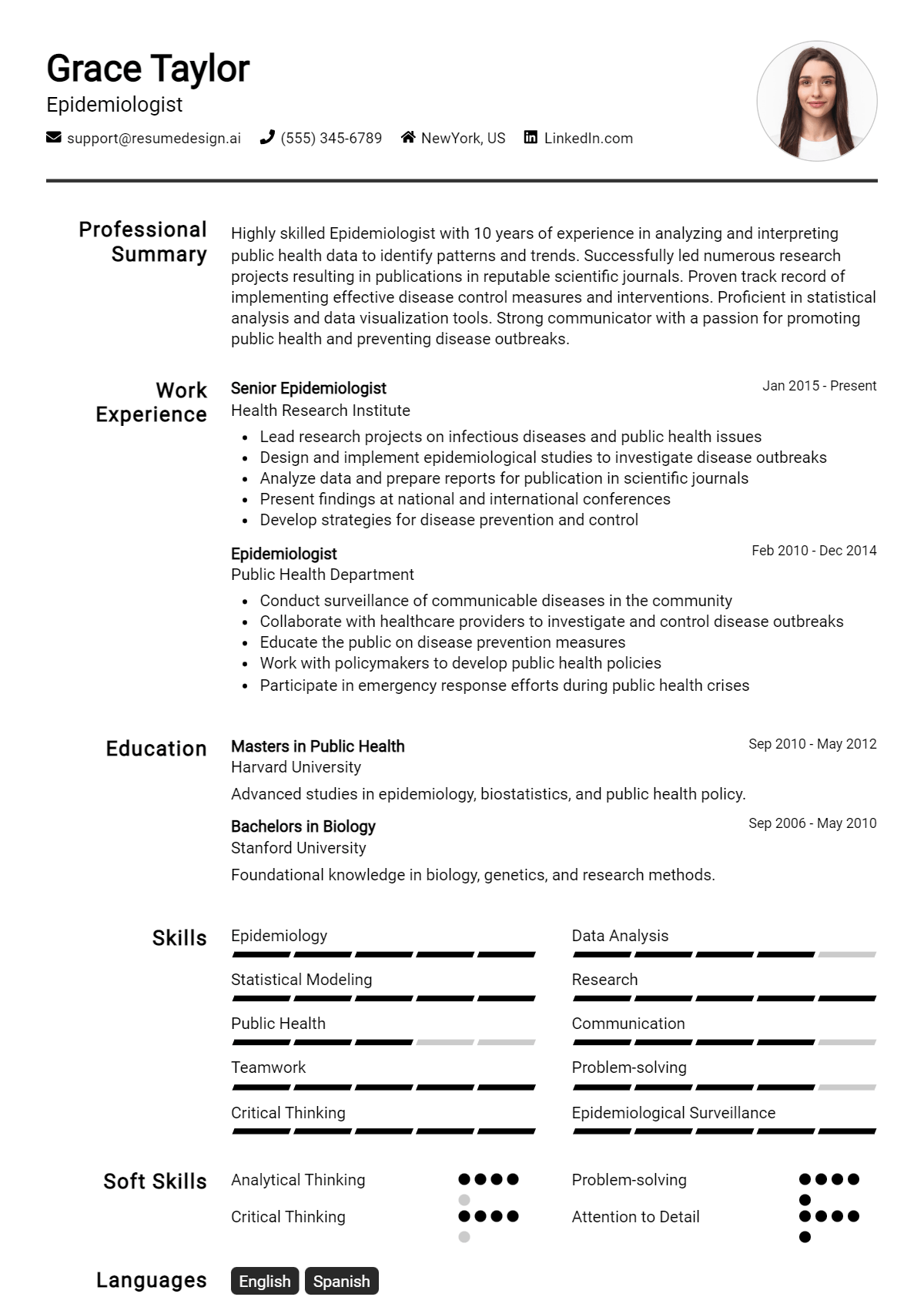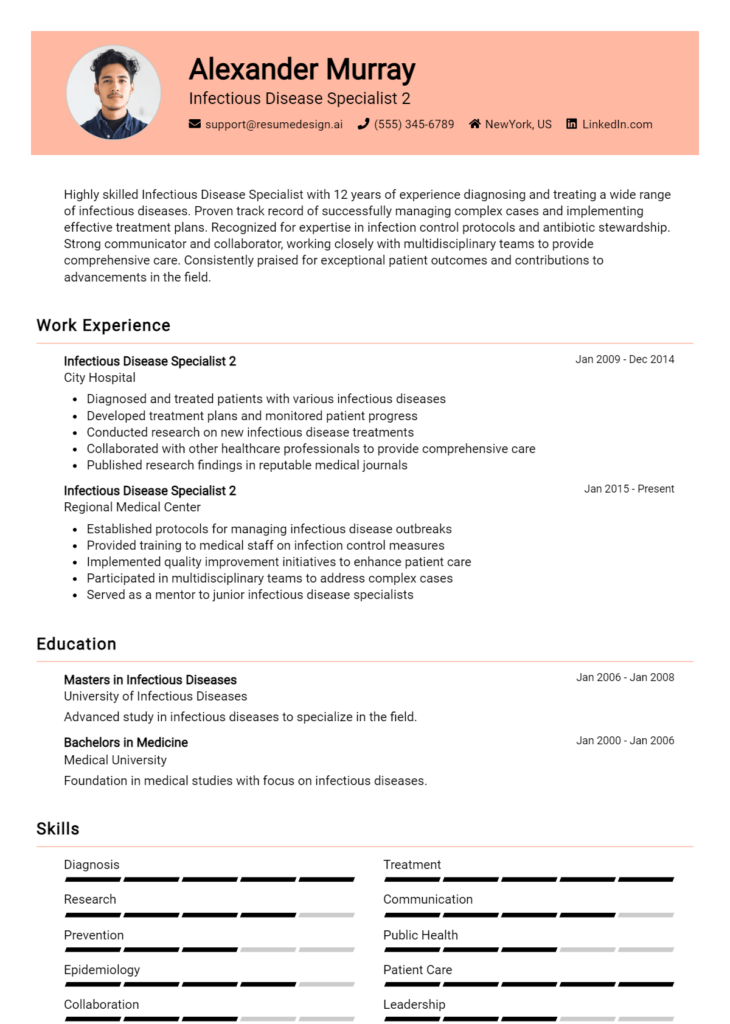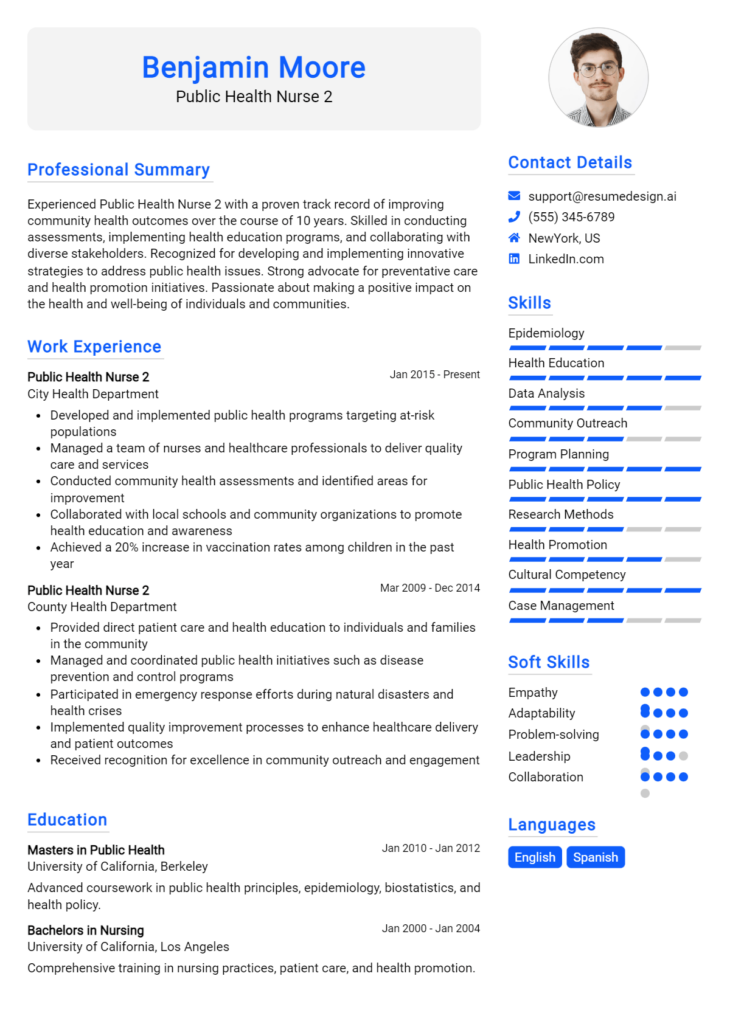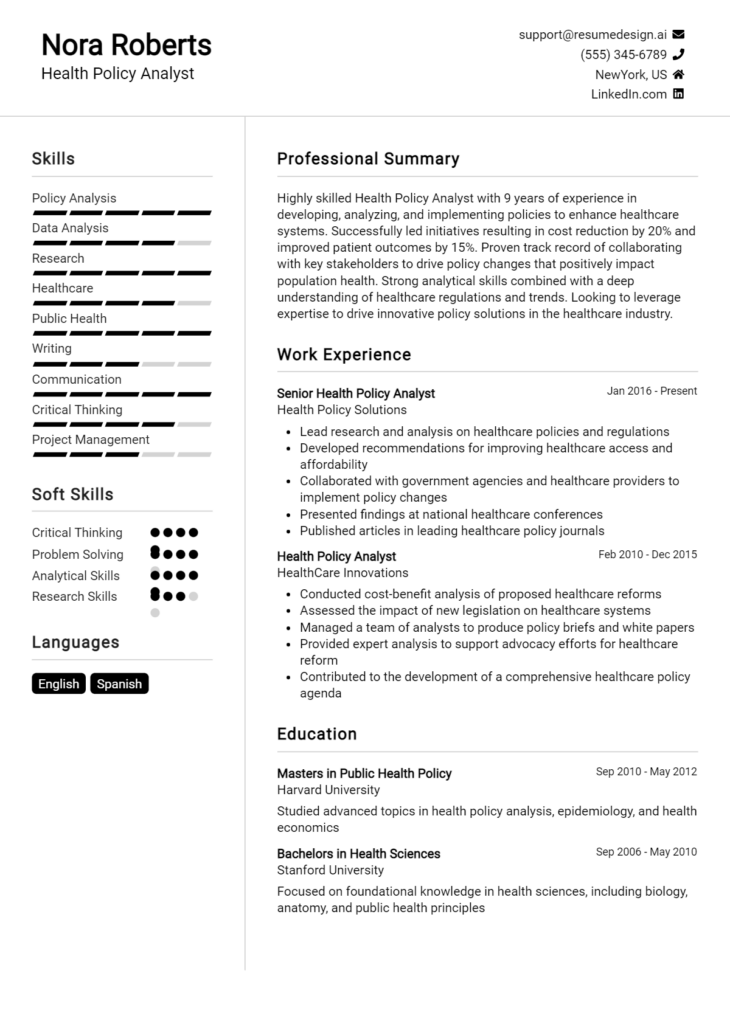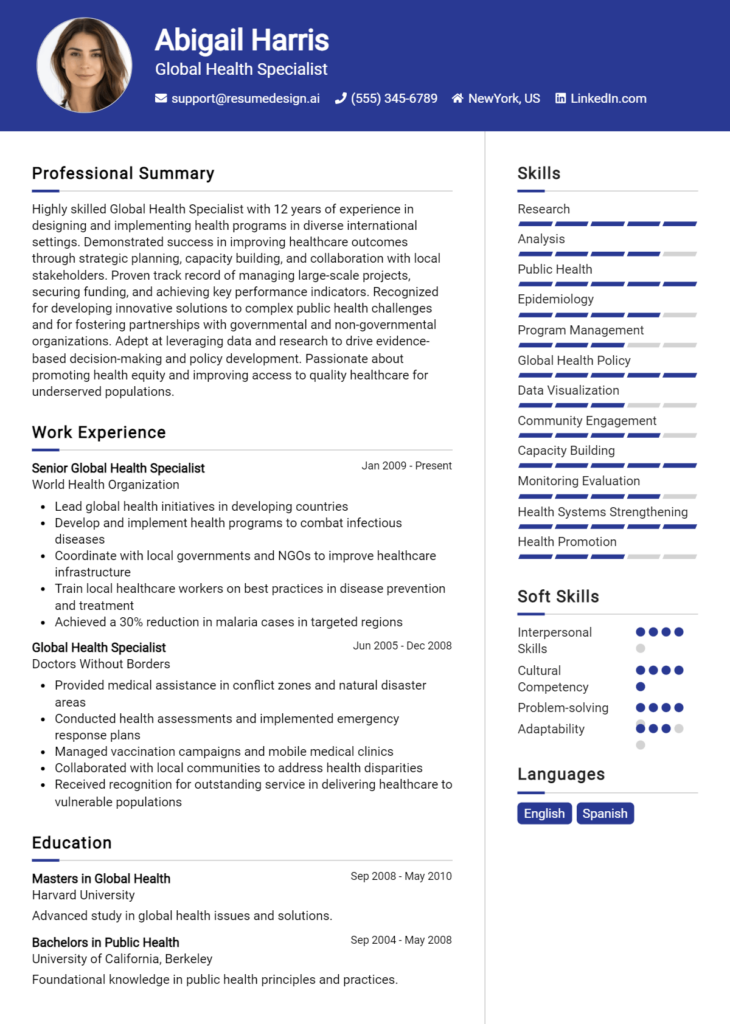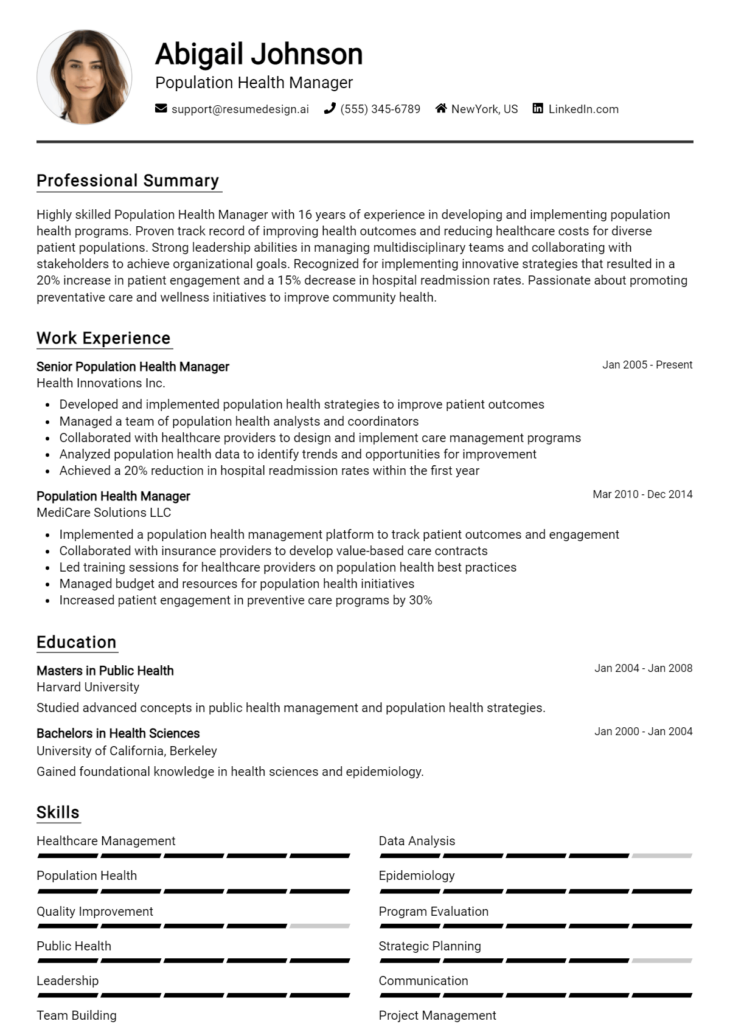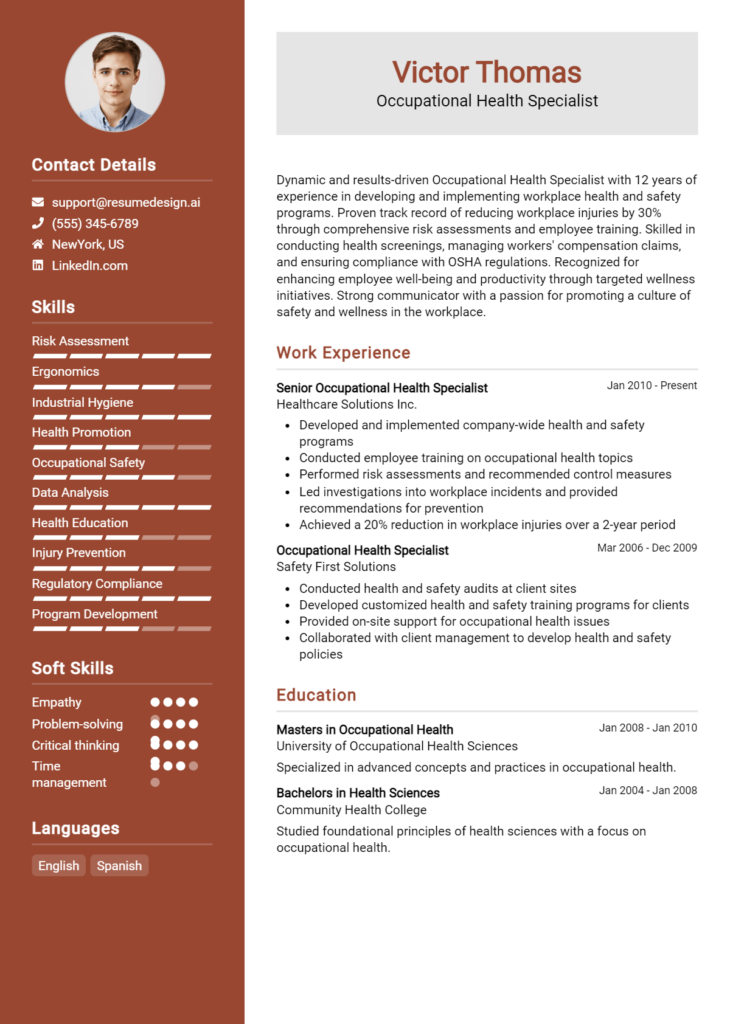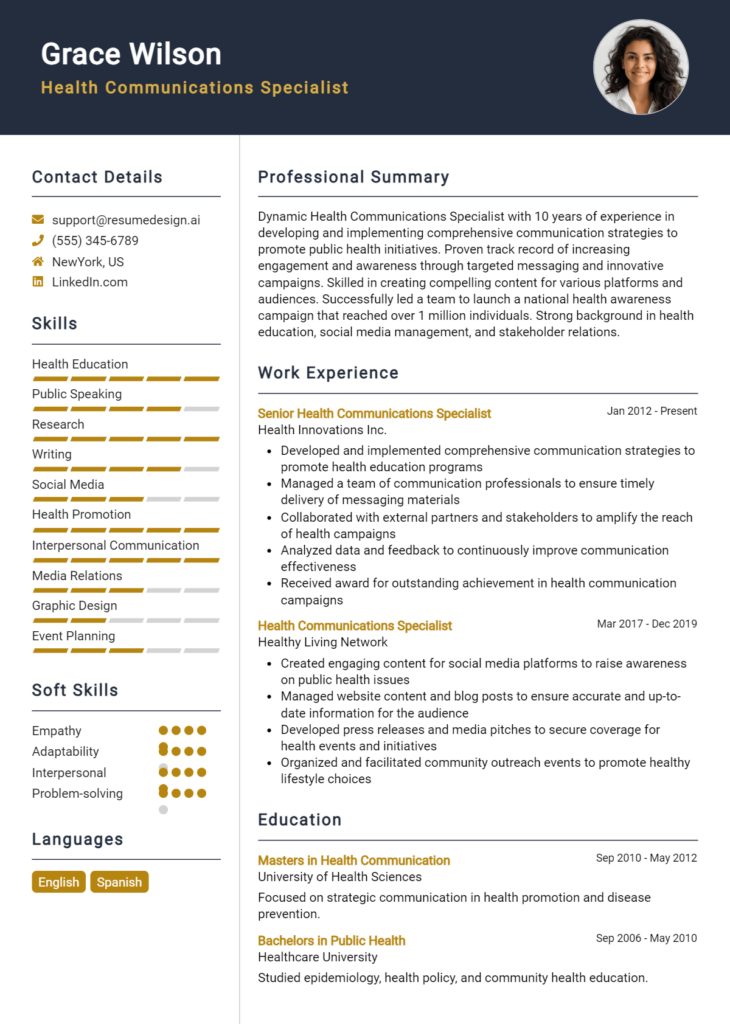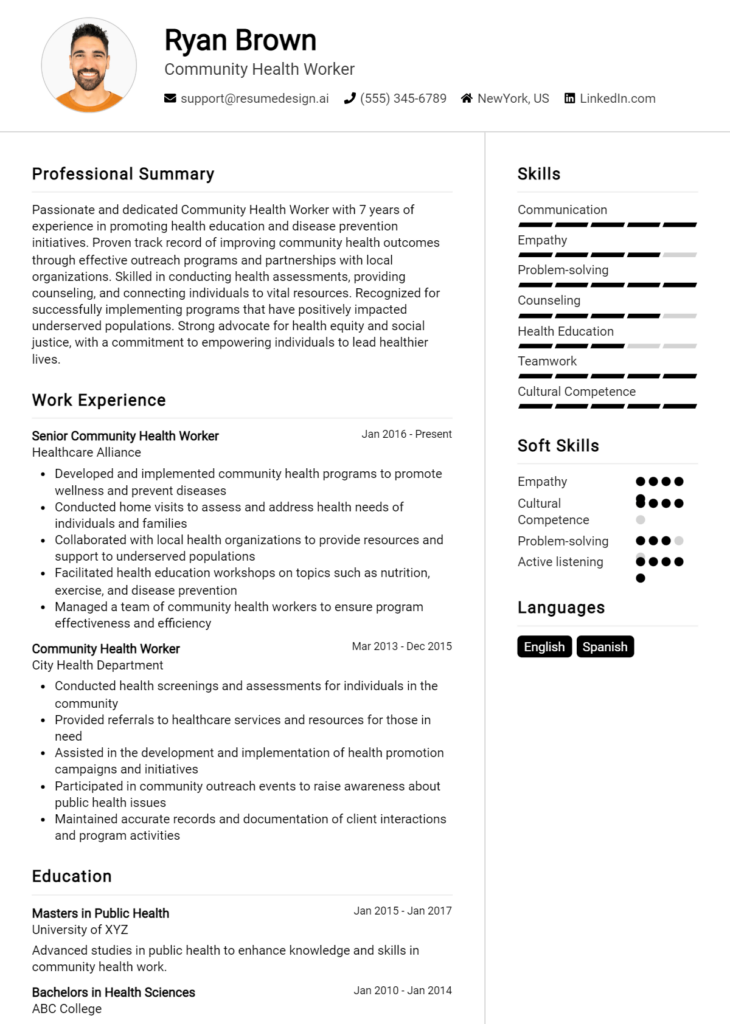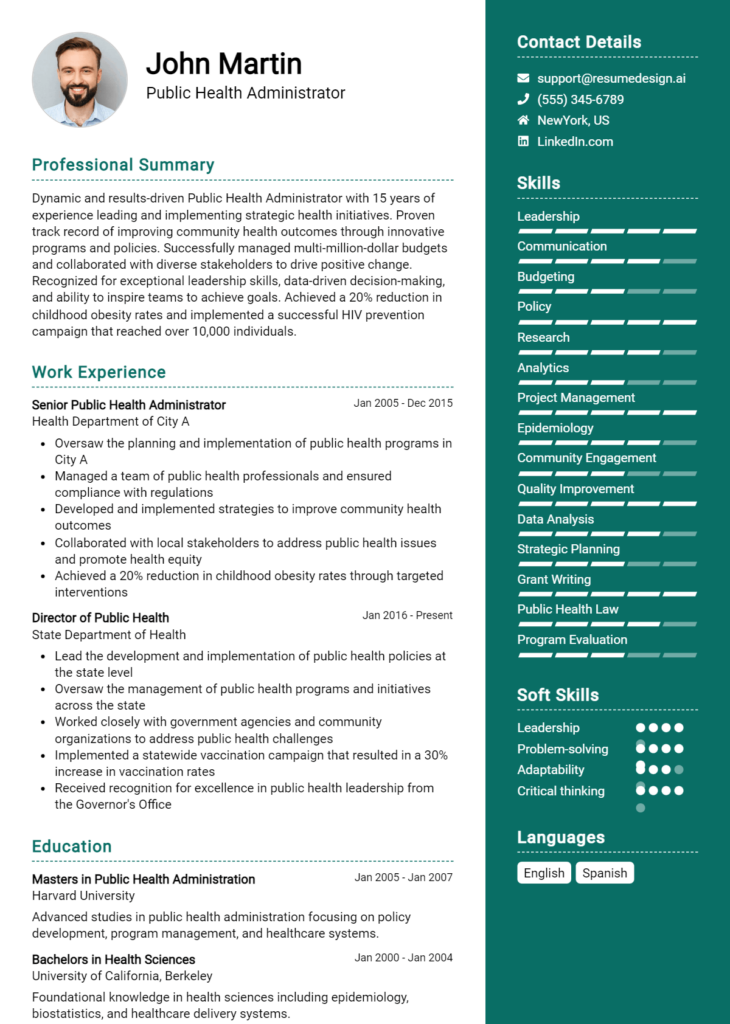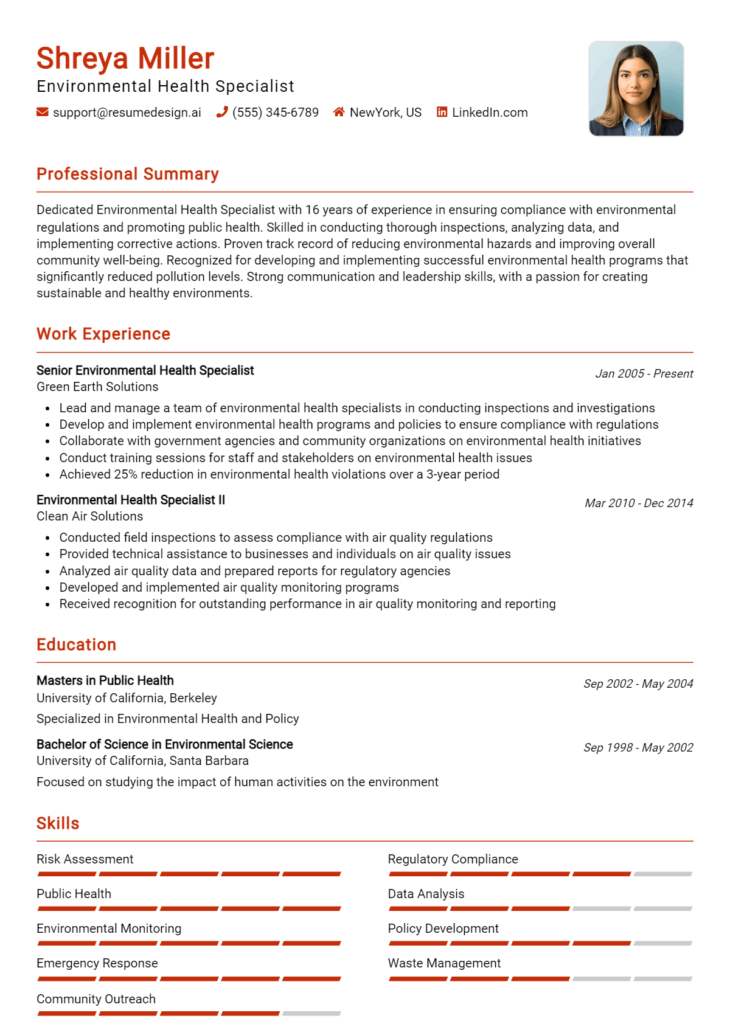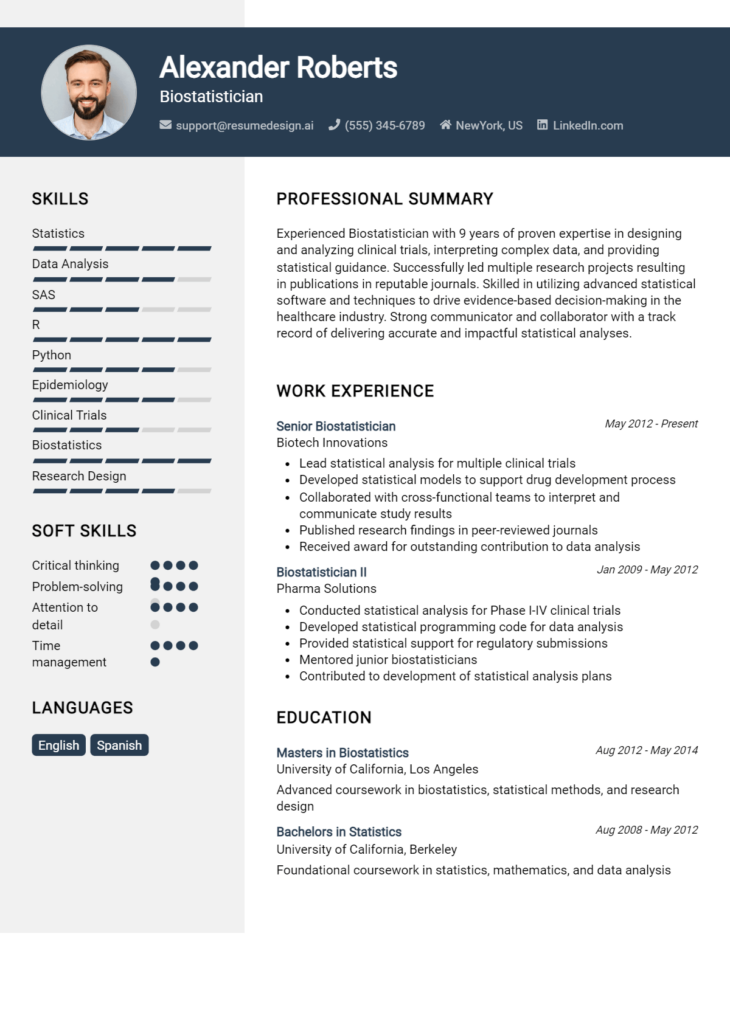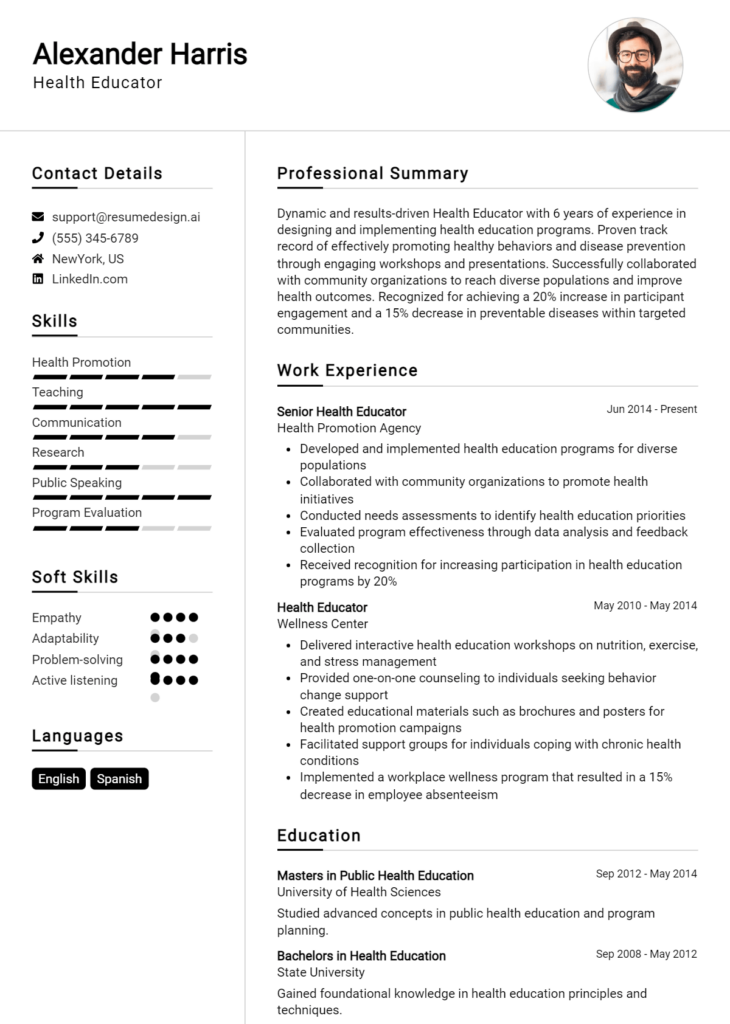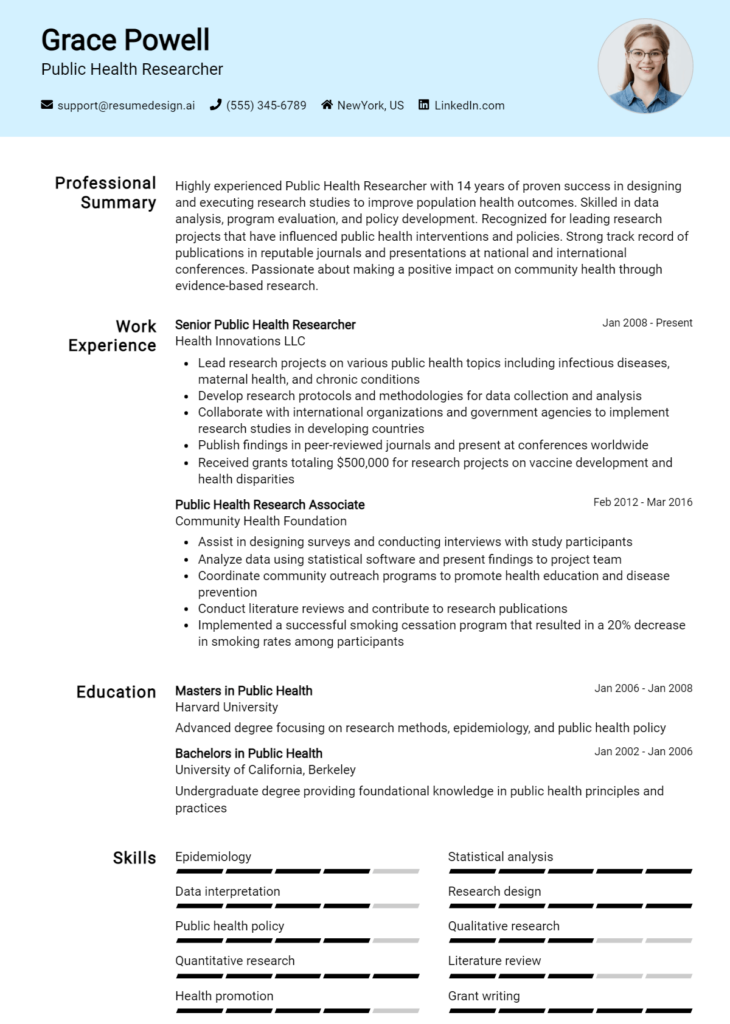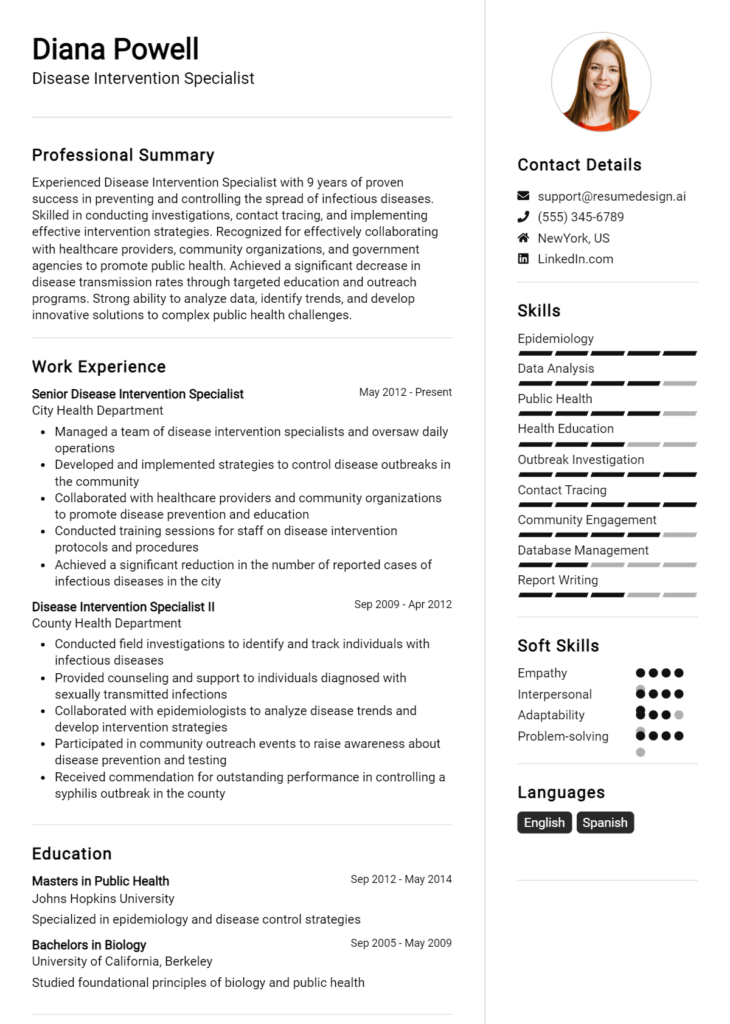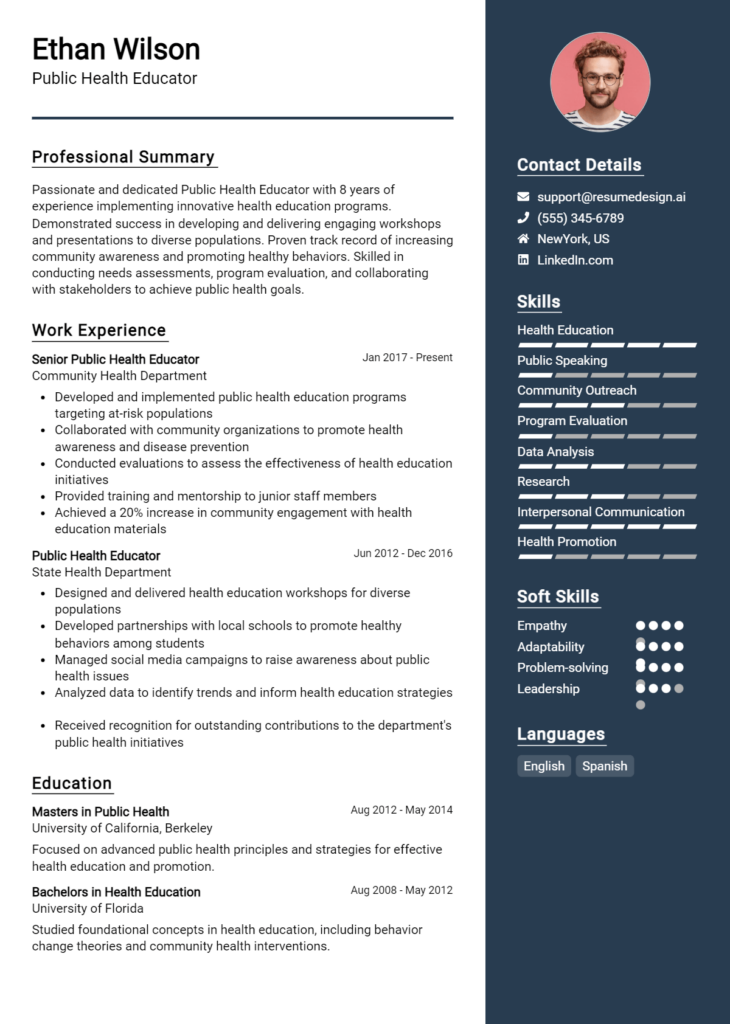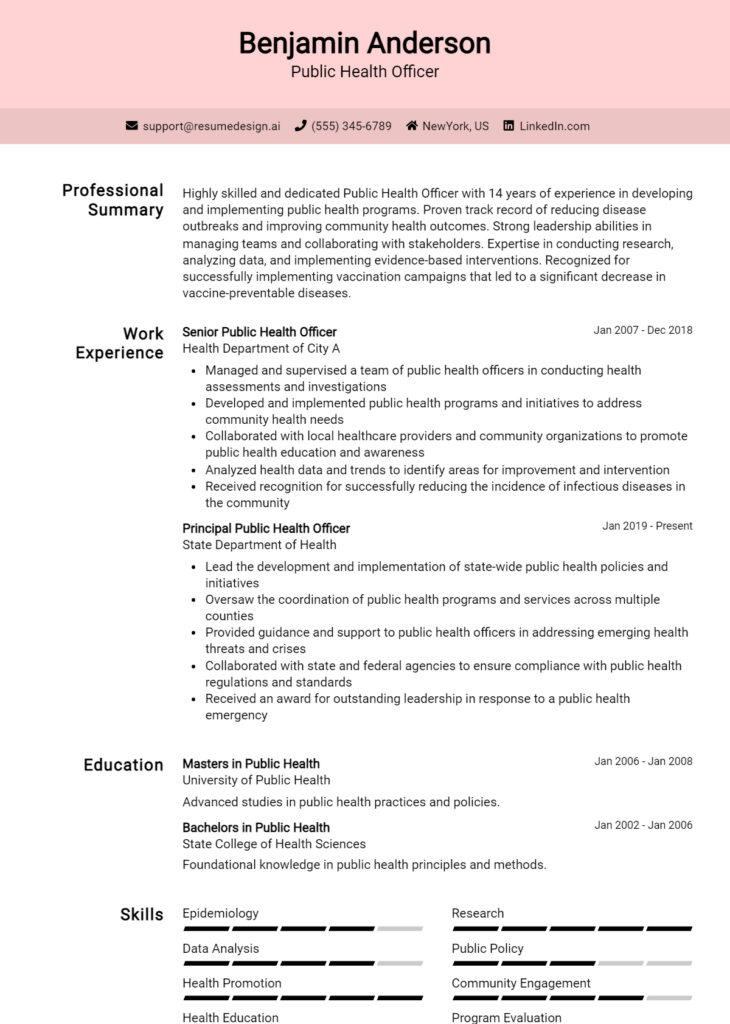Epidemiologist Core Responsibilities
Epidemiologists play a crucial role in public health by analyzing data to track disease patterns and develop strategies for prevention and control. They must possess strong technical skills in statistical analysis, operational knowledge of health systems, and exceptional problem-solving abilities to effectively collaborate across various departments. These competencies are vital for achieving the organization’s health objectives. A well-structured resume that highlights these qualifications can significantly enhance job prospects in this competitive field.
Common Responsibilities Listed on Epidemiologist Resume
- Conducting epidemiological research and studies to identify health trends.
- Analyzing data using statistical software and presenting findings.
- Collaborating with public health officials and community organizations.
- Designing and implementing disease control programs.
- Monitoring and evaluating public health interventions.
- Preparing reports and policy recommendations based on research findings.
- Educating the public and stakeholders on health risks and preventive measures.
- Conducting field investigations during disease outbreaks.
- Maintaining databases and health information systems.
- Participating in grant writing and funding proposals for research projects.
- Staying updated with the latest epidemiological trends and methodologies.
High-Level Resume Tips for Epidemiologist Professionals
In the competitive field of epidemiology, a well-crafted resume serves as a vital tool for professionals looking to make their mark. Often the first impression made on a potential employer, a resume must effectively reflect not only a candidate's skills and achievements but also their understanding of public health dynamics. A strong resume can set the stage for interviews and further discussions. This guide will provide practical and actionable tips specifically tailored for Epidemiologist professionals, helping them to create resumes that stand out in a crowded job market.
Top Resume Tips for Epidemiologist Professionals
- Tailor your resume to each job description, emphasizing the specific qualifications and experiences requested by the employer.
- Showcase relevant experience by highlighting internships, research projects, or roles in public health initiatives that demonstrate your expertise.
- Quantify your achievements with concrete data, such as the number of studies conducted or the percentage of disease reduction achieved in a project.
- Highlight industry-specific skills like statistical analysis, data management, and knowledge of epidemiological software tools.
- Include any certifications related to epidemiology or public health, such as the Certified in Public Health (CPH) credential.
- Utilize a clear and professional format, ensuring that your resume is easy to read and visually appealing.
- Incorporate keywords from the job listing to increase the chances of passing through applicant tracking systems.
- Demonstrate your communication skills by briefly summarizing complex projects or research findings in layman's terms.
- Address any gaps in employment with explanations that focus on professional development, volunteer work, or additional training.
By implementing these tips, Epidemiologist professionals can significantly enhance their resumes, increasing their chances of landing a job in this vital and evolving field. A polished and targeted resume not only captures the attention of hiring managers but also effectively communicates a candidate's unique contributions to public health and disease prevention.
Why Resume Headlines & Titles are Important for Epidemiologist
In the competitive field of epidemiology, a well-crafted resume headline or title is crucial for standing out among numerous applicants. These brief phrases serve as the first impression a hiring manager has of a candidate, summarizing key qualifications and professional strengths in a concise manner. A strong headline can instantly grab attention, providing a snapshot of the applicant's expertise and aligning with the specific demands of the job. By ensuring that the headline is relevant, impactful, and directly related to the position being sought, candidates can significantly increase their chances of making a positive first impression.
Best Practices for Crafting Resume Headlines for Epidemiologist
- Keep it concise: Aim for one to two impactful sentences.
- Be role-specific: Tailor the headline to reflect the specific epidemiologist position.
- Highlight key qualifications: Focus on unique skills or experiences that set you apart.
- Use strong action words: Start with verbs that convey dynamism and competence.
- Incorporate relevant keywords: Use terminology that aligns with the job description.
- Showcase accomplishments: If applicable, include notable achievements that demonstrate expertise.
- Maintain professionalism: Ensure the tone is formal and appropriate for the application context.
- Revise and refine: Continuously review and update the headline based on feedback or changes in career focus.
Example Resume Headlines for Epidemiologist
Strong Resume Headlines
Dynamic Epidemiologist Specializing in Infectious Disease Research and Data Analysis
Experienced Public Health Analyst with Proven Track Record in Outbreak Response and Prevention Strategies
Results-Driven Epidemiologist with Expertise in Statistical Modeling and Population Health Studies
Innovative Epidemiologist with 5+ Years in Epidemiological Surveillance and Health Program Evaluation
Weak Resume Headlines
Epidemiologist Seeking Job
Hardworking Individual Looking for Opportunities in Public Health
The strong headlines are effective because they convey specific expertise and accomplishments, instantly providing hiring managers with information that illustrates the candidate's qualifications for the role. In contrast, the weak headlines lack specificity and clarity, making them forgettable and failing to communicate the candidate's unique value. By focusing on impactful language and relevant details, strong headlines create a compelling narrative that engages potential employers from the outset.
Writing an Exceptional Epidemiologist Resume Summary
A well-crafted resume summary is crucial for an Epidemiologist, as it serves as the first impression to hiring managers. In a field where analytical skills, research experience, and public health knowledge are paramount, a strong summary can quickly capture attention by highlighting key skills, relevant experience, and notable accomplishments. This brief yet impactful statement should be concise and tailored to the specific job being applied for, ensuring that it aligns with the expectations and requirements outlined in the job description.
Best Practices for Writing a Epidemiologist Resume Summary
- Quantify Achievements: Use numbers to demonstrate the impact of your work, such as percentage improvements or the number of studies conducted.
- Focus on Relevant Skills: Highlight essential skills specific to epidemiology, such as data analysis, research methodologies, and public health communication.
- Tailor for the Job Description: Customize your summary to reflect the keywords and requirements mentioned in the job posting.
- Be Concise: Keep your summary brief, ideally between 3-5 sentences, to maintain the reader's attention.
- Use Action-Oriented Language: Start with strong action verbs to convey your contributions effectively.
- Showcase Relevant Experience: Mention specific roles, projects, or research that directly relate to the job you are applying for.
- Include Certifications: If applicable, mention any relevant certifications or specialized training that enhance your qualifications.
- Emphasize Collaboration: Highlight experience working with multidisciplinary teams, as collaboration is vital in public health initiatives.
Example Epidemiologist Resume Summaries
Strong Resume Summaries
Detail-oriented epidemiologist with over 8 years of experience in infectious disease surveillance, having successfully reduced outbreak response times by 30% through improved data collection methods. Proficient in statistical analysis software including SAS and R, with a strong background in community health initiatives.
Results-driven epidemiologist skilled in conducting epidemiological research and public health assessments. Led a team that analyzed health data for a population of over 500,000, identifying key health trends that informed local health policies, resulting in a 15% increase in vaccination rates.
Dedicated epidemiologist with a Ph.D. in Epidemiology and extensive experience in chronic disease epidemiology. Developed and implemented a state-wide survey that improved data accuracy by 40%, directly influencing funding allocations for critical health programs.
Weak Resume Summaries
Epidemiologist with experience in research and data analysis looking for a new opportunity. I am hardworking and willing to learn.
Public health professional with a general background in epidemiology seeking a job. Interested in working with communities to improve health outcomes.
The strong resume summaries are effective because they provide specific, quantifiable achievements that demonstrate the candidate's impact and relevance to the role of an epidemiologist. They utilize precise language and highlight essential skills, making them appealing to hiring managers. In contrast, the weak summaries lack detail and specificity, failing to showcase any significant accomplishments or relevant skills, which diminishes their effectiveness in capturing the attention of potential employers.
Work Experience Section for Epidemiologist Resume
The work experience section of an Epidemiologist resume is a critical component that highlights a candidate's practical skills and accomplishments in the field. This section not only showcases technical proficiencies in data analysis, disease tracking, and public health interventions but also emphasizes the candidate's ability to lead teams and deliver high-quality results. By quantifying achievements and aligning experiences with industry standards, candidates can present compelling evidence of their impact on public health initiatives and research projects, making a strong case for their candidacy.
Best Practices for Epidemiologist Work Experience
- Highlight specific technical skills relevant to epidemiology, such as statistical analysis, GIS mapping, or laboratory techniques.
- Quantify your achievements with metrics, such as the percentage reduction in disease incidence or the number of research publications.
- Demonstrate leadership abilities by mentioning team management, project coordination, or mentorship roles.
- Focus on collaboration by detailing partnerships with public health agencies, academic institutions, or community organizations.
- Use action verbs to describe your contributions, such as "developed," "analyzed," "implemented," or "collaborated."
- Tailor your work experience to align with the specific requirements of the position you are applying for.
- Include relevant certifications or training that enhance your qualifications in the field of epidemiology.
- Showcase any innovative solutions or strategies you introduced that improved processes or outcomes.
Example Work Experiences for Epidemiologist
Strong Experiences
- Led a team of 5 in a multi-state outbreak investigation, resulting in a 30% decrease in infection rates through targeted public health interventions.
- Developed a predictive model for disease spread that increased the accuracy of forecasting by 25%, aiding in resource allocation during flu seasons.
- Collaborated with local health departments to implement a vaccination program that achieved a 40% increase in community immunization rates over one year.
- Published 3 peer-reviewed articles on epidemiological methods, contributing to the advancement of research in infectious disease control.
Weak Experiences
- Worked on various health projects and helped with data collection.
- Participated in team meetings and contributed ideas occasionally.
- Assisted with research tasks and learned about epidemiology.
- Was part of a project that aimed to address health issues in the community.
The examples classified as strong experiences are characterized by their specificity, quantifiable results, and demonstrable leadership and collaboration efforts. They provide clear evidence of the candidate's impact and technical expertise. In contrast, the weak experiences are vague and lack measurable outcomes, making it difficult to assess the candidate's contributions and effectiveness in their roles. Strong experiences create a compelling narrative that enhances the candidate's appeal to potential employers.
Education and Certifications Section for Epidemiologist Resume
The education and certifications section of an Epidemiologist resume is crucial as it serves as a testament to the candidate's academic foundations and ongoing commitment to professional development. This section not only highlights the essential degrees and industry-relevant certifications that equip an epidemiologist with the necessary skills and knowledge but also illustrates the candidate's dedication to continuous learning in a constantly evolving field. By providing details on relevant coursework, specialized training, and recognized certifications, candidates can significantly enhance their credibility and demonstrate a strong alignment with the requirements of the job role, thereby making a compelling case for their candidacy.
Best Practices for Epidemiologist Education and Certifications
- Include relevant degrees such as a Master's or Ph.D. in Public Health, Epidemiology, or a related field.
- Highlight industry-recognized certifications, such as Certified Epidemiologist (CE) or Certified in Public Health (CPH).
- Provide details on relevant coursework, especially those that pertain directly to epidemiological methods and biostatistics.
- List any specialized training or workshops attended that relate to current trends in epidemiology.
- Ensure clarity and conciseness, avoiding overly technical jargon that may not be familiar to all hiring managers.
- Tailor the education and certifications section to the specific job application, emphasizing the most relevant qualifications.
- Keep the section updated to reflect new degrees, certifications, or training as they are obtained.
- Consider including honors or awards received during academic pursuits that demonstrate excellence in the field.
Example Education and Certifications for Epidemiologist
Strong Examples
- M.P.H. in Epidemiology, Harvard University, 2021
- Certified in Public Health (CPH), National Board of Public Health Examiners, 2022
- Advanced Biostatistics, Coursera (offered by Johns Hopkins University), 2020
- Certificate in Infectious Disease Epidemiology, University of California, Berkeley, 2023
Weak Examples
- Bachelor of Arts in English Literature, University of California, Los Angeles, 2015
- Certification in Basic Life Support (BLS), American Heart Association, 2018
- Outdated certification in Medical Coding, 2016
- High School Diploma, Springfield High School, 2010
The examples provided illustrate a clear distinction between strong and weak qualifications. Strong examples feature relevant degrees and certifications that align directly with the field of epidemiology, showcasing the candidate's preparedness and expertise. In contrast, weak examples highlight qualifications that are either unrelated to epidemiology or outdated, which do not contribute to the candidate's credibility for the role and could detract from their overall application.
Top Skills & Keywords for Epidemiologist Resume
As an Epidemiologist, the ability to effectively communicate complex data, collaborate with diverse teams, and maintain a meticulous approach to research is paramount. A well-crafted resume that highlights both hard and soft skills is essential for standing out in this competitive field. Skills not only showcase your qualifications and expertise but also demonstrate your ability to adapt and thrive in various environments. When potential employers review your resume, they look for evidence of your analytical capabilities, problem-solving skills, and your commitment to public health. A strong focus on skills can significantly enhance your chances of securing a position and contributing to vital health initiatives.
Top Hard & Soft Skills for Epidemiologist
Hard Skills
- Biostatistics
- Data Analysis
- Geographic Information Systems (GIS)
- Research Methodology
- Statistical Software (e.g., SAS, R, SPSS)
- Surveillance Systems
- Laboratory Techniques
- Public Health Policy
- Study Design
- Infectious Disease Control
- Epidemiological Modeling
- Health Informatics
- Data Visualization
- Clinical Trials
- Risk Assessment
- Environmental Health
- Community Health Assessment
Soft Skills
- Critical Thinking
- Communication Skills
- Team Collaboration
- Adaptability
- Problem Solving
- Attention to Detail
- Time Management
- Leadership
- Empathy
- Conflict Resolution
- Project Management
- Creativity
- Interpersonal Skills
- Cultural Competence
- Ethical Judgement
- Initiative
- Motivational Skills
For more insights on how to effectively incorporate these skills into your resume and highlight relevant work experience, consider utilizing tailored examples that reflect your unique qualifications as an Epidemiologist.
Stand Out with a Winning Epidemiologist Cover Letter
Dear [Hiring Manager's Name],
I am writing to express my interest in the Epidemiologist position at [Company/Organization Name] as advertised on [Where You Found the Job Posting]. With a Master’s degree in Public Health and over [X years] of experience in epidemiological research, I have developed a robust skill set in data analysis, disease surveillance, and public health policy implementation. My background in studying infectious disease patterns and my passion for community health make me an excellent fit for your team.
In my previous role at [Previous Company/Organization Name], I successfully led a project analyzing the spread of [specific disease or condition], which contributed to the development of targeted intervention strategies that reduced incidence rates by [percentage or outcome]. My hands-on experience with statistical software, such as SAS and R, allowed me to derive meaningful insights from complex data sets, ensuring accurate reporting and facilitating informed decision-making among stakeholders. Furthermore, my collaborative work with public health officials and community organizations has honed my ability to communicate complex epidemiological concepts in an accessible manner.
I am particularly drawn to the mission of [Company/Organization Name] to [specific mission or goal related to public health]. I am excited about the opportunity to contribute my expertise in epidemiological research and data interpretation to help advance your initiatives. I am committed to leveraging my analytical skills and public health knowledge to not only address current health challenges but also to anticipate future public health needs.
Thank you for considering my application. I look forward to the possibility of discussing how my background, skills, and enthusiasms align with the goals of [Company/Organization Name]. I am eager to bring my expertise in epidemiology to your esteemed team and contribute to impactful public health outcomes.
Sincerely,
[Your Name]
[Your Contact Information]
[Your LinkedIn Profile or Professional Website]
Common Mistakes to Avoid in a Epidemiologist Resume
When crafting a resume for an epidemiologist position, it is crucial to present your qualifications and experiences clearly and effectively. However, many applicants make common mistakes that can undermine their chances of standing out in a competitive job market. By avoiding these pitfalls, you can enhance your resume's impact and better showcase your expertise in public health and disease prevention.
Neglecting to Tailor the Resume: Failing to customize your resume for each specific job application can lead to a generic presentation that does not highlight the most relevant experiences and skills for the position.
Omitting Key Skills: Not including critical skills such as statistical analysis, data interpretation, and knowledge of epidemiological software can make your resume less compelling to hiring managers looking for specific expertise.
Using Jargon Without Explanation: Overloading your resume with technical terms and jargon without clear explanations can alienate readers who may not be familiar with all the terminology, especially non-technical hiring managers.
Ignoring Quantifiable Achievements: Listing responsibilities rather than accomplishments can weaken your resume. Use numbers and specific examples to demonstrate the impact of your work, such as reduction in disease rates or successful program implementations.
Inconsistent Formatting: A resume with inconsistent formatting, such as varying font sizes or styles, can appear unprofessional. Consistency in layout, font, and spacing is key to creating a polished document.
Overloading with Irrelevant Information: Including unrelated work experience or excessive personal details can distract from your qualifications. Focus on relevant experience in epidemiology and public health to maintain clarity.
Neglecting Soft Skills: While technical skills are essential, overlooking soft skills such as communication, teamwork, and problem-solving can diminish the overall strength of your application, as these are vital in collaborative public health environments.
Failing to Proofread: Typos and grammatical errors can create a negative impression and suggest a lack of attention to detail, which is crucial in epidemiological work. Always proofread your resume or have someone else review it before submission.
Conclusion
As we have explored the vital role of epidemiologists in public health, it is clear that these professionals are essential for understanding and controlling the spread of diseases. Their work involves analyzing data, conducting research, and implementing strategies to improve health outcomes for populations. The skills and expertise required for this role are highly specialized, and an effective resume is crucial in showcasing these qualifications to potential employers.
In summary, remember to highlight your relevant education, research experience, and analytical skills that are pertinent to epidemiology. Additionally, consider including any public health initiatives you have contributed to, as well as your proficiency in statistical software and data analysis techniques.
Now is the perfect time to review and enhance your Epidemiologist Resume. Ensure that it reflects your unique experiences and qualifications. To assist you in this process, utilize the following resources:
- Explore a variety of resume templates that can help you create a professional layout.
- Try out the resume builder for an easy and efficient way to craft your resume.
- Check out resume examples for inspiration on how to present your skills and accomplishments effectively.
- Don’t forget to prepare a compelling introduction with the help of cover letter templates tailored for the field of epidemiology.
Take action today and invest time in refining your resume to stand out in this competitive field!

